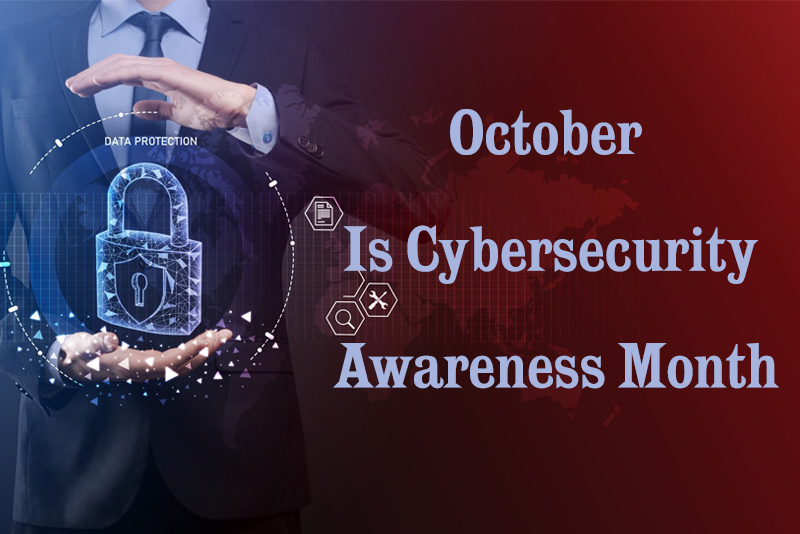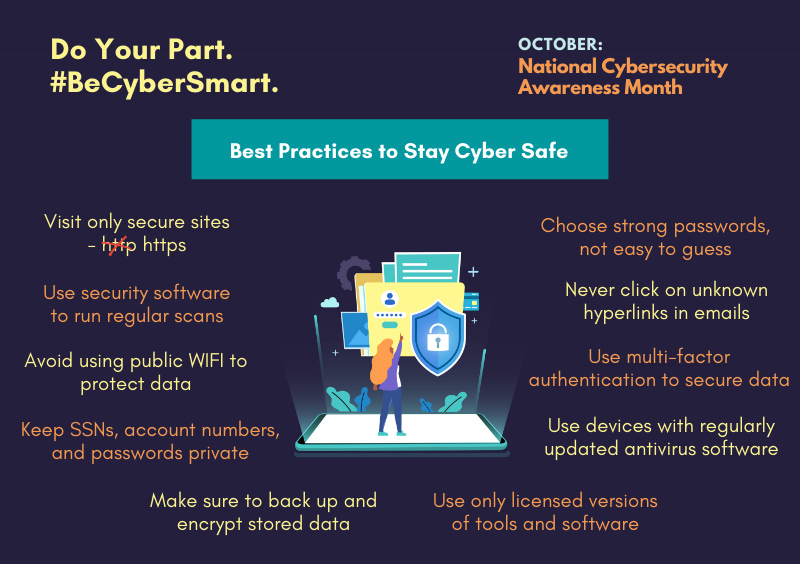Cybersecurity refers to protecting networks, devices, and data from illegal access or illicit use. Since 2003, October is observed as Cybersecurity Awareness Month by the National Cyber Security Alliance (NCSA) & the U.S. Department of Homeland Security. This month aims at raising awareness about the importance of cybersecurity across the nation. It also makes sure that all Americans have the resources they need to be safe and secure online. This year’s theme for the month is “Do Your Part. #BeCyberSmart.” This theme encourages individuals and businesses to understand the importance of taking practical steps to enhance cybersecurity. Proper measures are necessary to increase online security and prevent data breaches and other online threats. Even when you are taking support from a business process outsourcing company to get your back-office tasks done, make sure the company follows stringent data security policies.
In 2021, the Cybersecurity & Infrastructure Security Agency (CISA) and NCSA are focusing on the following areas –
-
- Week of October 4 (Week 1): Be Cyber Smart.
-
- Week of October 11 (Week 2): Phight the Phish!
-
- Week of October 18 (Week 3): Explore. Experience. Share. – Cybersecurity Career Awareness Week
- Week of October 25 (Week 4): Cybersecurity First
Attackers exploit various vulnerabilities to compromise the security of networks and devices. Most of us use laptops, desktop computers, smartphones, wireless printers, and other devices to constantly exchange data to complete tasks. These devices, when used incorrectly by employees, can lead to data compromise. If you fail to follow proper security measures, cyber criminals may steal personal information, and banking credentials, which can cause significant financial loss. Cyber attacks may come in many forms – phishing & spoofing, identity theft, ransomware attack, social media account hacking, and website attacks. Spoofing attacks may use email addresses, sender names or phone numbers that are disguised as a trusted source. You need to be vigilant to keep personal, business and customer data safe and secure.
Here are some key tips that CISA recommends to stay safe online –
-
- Keep your software updated to the latest version available. Turn on automatic updates and maintain your security settings to keep your information safe. Use security software to run regular scans.
-
- Cybercriminals can gather information from social media sites. Limit the information you post on social media. Train your staff to avoid oversharing on social media and never conduct official business or share personally identifiable information (PII) on social media platforms.
-
- Keep Social Security numbers, account numbers, and passwords private and disable location services that allow people to see where you are.
-
- Use only organization-approved software and tools such as video conferencing and collaboration tools to initiate and schedule meetings for business, including company provided or approved video.
-
- Take security precautions to ensure your meeting is only attended by intended individuals. Only share data that is necessary to accomplish the goals of your meeting.
-
- Be cautious of unusual sources. Do not click on unknown hyperlinks in emails. Hover over links to verify authenticity and delete suspicious messages after reporting phishing attempts to a supervisor.
-
- The more we travel, the more we are at risk for cyberattacks. While traveling, make sure you practice safe online behavior and take practical steps, mainly to secure internet-enabled devices.
-
- Consider using multi-factor authentication or two-factor authentication to better secure your information and identity online. Ensure that the only person who has access to your account is you. Consider using the longest password or passphrase permissible.
-
- Never make passwords that are easy to guess. Take proper security precautions and ensure correct configuration to wireless devices in order to prevent data breaches.
- Make sure all of your computers, Internet of Things devices, phones, and tablets are equipped with regularly updated antivirus software, firewalls, email filters, and anti-spyware.
Knowing how to protect the information stored is important not just for an individual but also for any organization.
 Being an experienced BPO company providing document scanning services and other solutions for start-ups and large companies, we ensure high confidentiality and security for all data we’re dealing with. We strictly follow data security laws and regulations to protect sensitive data and systems.To know more, contact us at 1-800-670-2809! |





